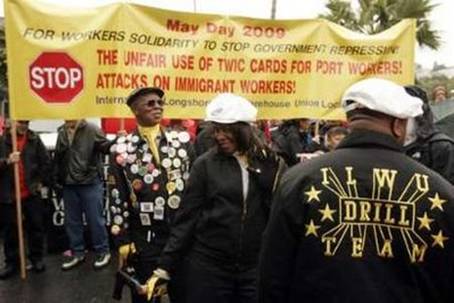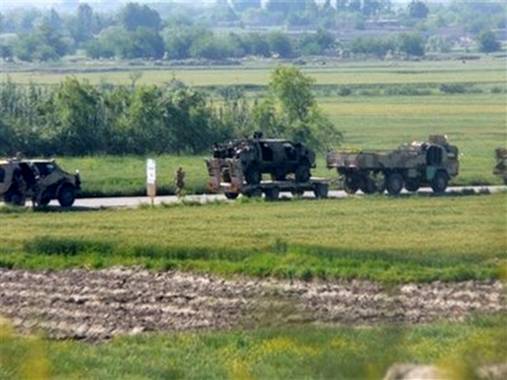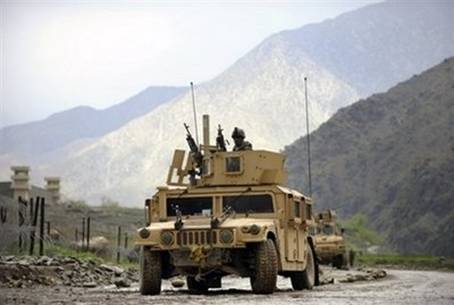GI SPECIAL
7E1:
May 1, 1886:
Noble Anniversary:
American Workers Create May Day

Carl Bunin Peace History April 30-May 6
May Day was called Emancipation Day in 1886
when 340,000 went on strike (though it was Saturday it was a regular workday)
in Chicago for the 8-hour day.
May 1, 1890:
May Day labor demonstrations spread to thirteen other countries; 30,000
marched in Chicago as the newly prominent American Federation of Labor threw
its weight behind the 8-hour day campaign.
International Workers’ Day (a name used
interchangeably with May Day) is a celebration of the social and economic
achievements of the international labor movement.
May Day commonly sees organized street
demonstrations and street marches by millions of working people and their
labour unions throughout most of the countries of the world
May Day has become an international
celebration of the social and economic achievements of the labour movement.
May 1, 2009 San Francisco:
“For Workers Solidarity To Stop Government
Repression”

Members of the International Longshore
Warehouse Union participate in a May Day rally at Dolores Park in San
Francisco, California May 1, 2009.
REUTERS/Robert Galbraith
May 1, 2009 San Francisco:
Victoria Siempre

People fill Broadway during a march and rally
for immigration law reform in Los Angeles Friday, May 1, 2009. Organizers are urging passage of an
immigration law that provides a path to citizenship for the nation’s
estimated 12 million illegal immigrants.
(AP Photo/Reed Saxon)
IRAQ WAR REPORTS
Three U.S. Troops Killed In Anbar
May 1, 2009 Multi National Corps Iraq Public Affairs Office, Camp
Victory RELEASE No. 20090501-01
AL ANBAR PROVINCE, Iraq – Two Marines
and one sailor were killed while conducting combat operations against enemy
forces here April 30.
The Great Iraqi Army Maintenance Training Fiasco:
$628 Million Spent, 8,000 Humvees Given Away, And
The Result Is Pure Clusterfuck;
“Iraqi Soldiers Abandoned A 90-Day
Maintenance Training Class Because They Hadn’t Been Paid In Weeks By
Their Units”
Apr 29, 2009 By Chelsea J. Carter, The
Associated Press
BAGHDAD — Iraq is falling far behind
schedule in creating a system to maintain its own military equipment, costing
American taxpayers hundreds of millions of dollars to fill in the gaps,
according to a new U.S. audit.
The U.S. has spent billions of dollars to
develop Iraq’s security forces with an emphasis in recent years on
developing Iraq’s maintenance and supply capabilities — seen as
essential for the country to maintain a self-sufficient force after the
lifeline from Washington is trimmed back.
But the audit — by the Special
Inspector General for Iraq Reconstruction — found a pattern of negligence
and shortcomings by the Iraqi military in planning for the basic needs of the
military: repairing and maintaining equipment and supplying troops.
The problems include not allocating enough
funds for logistics operations and failing to provide enough soldiers for
training, the audit said.
In one case, Iraqi soldiers
abandoned a 90-day maintenance training class in March 2008 because they hadn’t
been paid in weeks by their units.
The report said the Iraqi army has not yet
assigned other soldiers to take a class.
Initially, the contract costs were put at
about $208 million to train Iraqi soldiers in routine but critical roles that
include repairing equipment, construction and running warehouse operations.
The audit says the contract has ballooned to
more than $628 million in part because there was no clear blueprint for the
programs, which led to frequent extensions and cost overruns.
Col. Mike Sage, the assistant chief of staff
for logistics for Multi-National Security Transition Command, said developers
of a Humvee maintenance training program believed Iraqi commanders would jump
at the chance to have their soldiers learn how to care for the armored
vehicles.
As part of the contracts, the
U.S. gave Iraq more than 8,000 armored Humvees.
“We did not read the
commanders as well as we thought,” he said. “They would not commit
soldiers to train on (Humvees)” because they didn’t want to give up
the troops for the 90-day classes.
The report recommended the U.S. military
negotiate a firm agreement with the Iraqi government on a timetable to take
over maintenance responsibilities. An earlier draft of the audit recommended
withholding further U.S. funds until an accord was reached.
But the U.S. military said disrupting or
stopping any training projects already in progress would be a strategic error.
“It relies on Iraqis themselves to put
forth the effort to make themselves successful,” Sage said.
AFGHANISTAN WAR REPORTS
Three U.S. Troops Killed When Insurgents Storm
Military Outpost In Kunar:
Two Latvian Troops Also Dead
5.1.09 AFP & AP & BBC
Three US and two Latvian troops were killed
when insurgents stormed a military outpost in northeastern Afghanistan Friday,
officials said, in the deadliest incident for foreign forces here in months.
The militants attacked a small remote outpost
of soldiers in the mountainous northeastern province of Kunar near the border
with Pakistan, US military spokeswoman Captain Elizabeth Mathias told AFP.
The Latvian army announced in Riga that two
of its soldiers were killed and two wounded.
The Afghan ministry of defence spokesman,
General Mohammad Zahir Azimi, announced earlier Friday that Afghan troops had
come under attack in Kunar’s rugged Ghaziabad district and three soldiers
were killed and two wounded.
It could not immediately be confirmed if it
was the same incident but that appeared likely. The Taliban had claimed
responsibility.
About 30 soldiers were stationed in the
outpost, Mathias said.
It was the deadliest toll for foreign
soldiers in a single incident in Afghanistan since an August 18 attack on
French troops left 10 of them dead and 21 wounded.
Insurgents attacked with rocket-propelled
grenades and guns, NATO forces said in a statement.
A spokeswoman told Reuters news
agency the insurgents had attacked an outpost in eastern Afghanistan earlier on
Friday and struck an ammunition store, causing an explosion.
P.E.I. Soldier Wounded In Afghanistan
April 30, 2009 CBC News
A 24-year-old soldier from Cardigan, P.E.I., [Canada]
was wounded earlier this week in Afghanistan.
Capt. Tyler Collings is based with Lord
Strathcona’s Horse in Edmonton, and was training Afghan soldiers. His mother Valerie Collings told CBC News
Thursday she understands her son was on foot when a bomb went off nearby.
Collings has a serious eye wound and has lost
a few teeth.
Some of the Afghan soldiers Collings was with
were killed and others were wounded, she said.
Collings is being transported to a hospital in Germany Thursday
evening.
Four German Troops Wounded In Ali Abad

The damaged German armored personnel carrier
is transported away following an attack in Ali Abad district of Kunduz
province, north of Kabul, Afghanistan, April 29, 2009. The bomber jumped in
front of the German vehicle, wounding four German troops, the NATO-led force
said. (AP Photo)
The War At Firebase Vimoto
May 1, 2009 By C. J. CHIVERS, The New York Times Company
FIREBASE VIMOTO, Afghanistan — Three stone houses and a cluster
of sandbagged bunkers cling to a slope above the Korangal Valley, forming an
oval perimeter roughly 75 yards long. The oval is reinforced with timber and
ringed with concertina wire.
An Afghan flag flutters atop a tower where Afghan soldiers look out,
ducking when rifle shots snap by.
This is Firebase Vimoto, named for Pfc. Timothy R. Vimoto, an American
soldier killed in the valley two years ago. If all goes according to the
Pentagon’s plan, this tiny perimeter — home to an Afghan platoon
and two Marine Corps infantrymen — contains the future of Afghanistan.
The Obama administration hopes that eventually the Afghan soldiers within will
become self-sufficient, allowing the fight against the Taliban to be shifted to
local hands.
For now this vulnerable little land claim — in the hostile
village of Babeyal and supported by a network of American infantry positions
nearby — offers something else: a fine-grained glimpse inside the Afghan
war, and the remarkably young men often at the front of it.
There are nearly 30 Afghan soldiers here. Their senior mentor, Cpl.
Sean P. Conroy, of Carmel, N.Y., is 25 years old. His assistant, Lance Cpl.
Brandon J. Murray, of Fort Myers, Fla., is 21.
On the ground, far from the generals in Kabul and the policy makers in
Washington, the hour-by-hour conduct of the war rests in part in the deeds of
men this young, who have been given latitude to lead as their training and
instincts guide them.
Each day they organize and walk Afghan Army patrols in the valley
below, some of the most dangerous acreage in the world. Each night they
participate in radio meetings with the American posts along the ridges,
exchanging plans and intelligence, and plotting the counterinsurgency effort in
the ancient villages below.
In Corporal Conroy’s war, two Marines train Afghans in weapons,
tactics, first aid, hygiene and leadership. They keep the firebase supplied
with ammunition, water, batteries and food. They defecate in a rusting barrel
and urinate in a tube that slopes off a roof and drains into the air. Fly
strips surround them. They have no running water; their sleeping bunker stinks
of filthy clothes and sweat.
The corporal has tied a flea collar through his belt loops; he needs it
like a dog. He served two tours in Iraq. His four-year enlistment ended last
month, but he extended for nine months when promised he would be assigned to a
combat outpost in Afghanistan.
He hopes to attend college later. For now, he represents a class of
Marine and soldier that has quietly populated the ranks since 2003. He enlisted
not to pick up job skills or to travel the world at government expense. He
enlisted to fight. “We’re the new generation,” he said.
“I’ll tell you what — there are a lot of young Marines who’ve
seen more combat than all of the guys up top who joined in the ‘90s.”
He is supremely cocky, but unpretentious. When he met two journalists
from The New York Times he asked what news agency they represented. Hearing the
answer, he replied with one extended syllable: “Boooooo.” He
prefers a good tabloid, he said.
He does not hide that he likes his life here: the senior man in an
isolated post, surrounded by the Taliban, waking to a new patrol every day and
drilling what he calls the Alamo Plan, to be executed if the firebase is
overrun.
“This is the sweetest deal ever,” he said one evening
between firefights. “There is no other place I could get a job like this
— not at this rank.”
He woke the next day before 4 a.m. for a patrol. As he slipped into his
ammunition vest, he groused that back home, when conversations drift to the
war, the infantry too often is misunderstood. “You know what I don’t
like about America?” he said, in the chill beneath lingering stars.
“If you do what I do, then they think either you should have PTSD or you
are some sort of psychopath.” PTSD is post-traumatic stress disorder.
He exhaled cigarette smoke. “This is my job,” he said.
“There’s nothing wrong with it.”
The war in Afghanistan defies generalization. Each province, each
valley and each village can be its own universe, presenting its own problems
and demanding its own solutions.
In large areas of the countryside, the Americans try the softer touch
of local engagement: distributing aid, seeking allies and coaching a nascent
government to provide services on its own. Corporal Conroy and Lance Corporal
Murray drew a different sort of assignment.
Here there is no Afghan government. The valley long ago sank into an
old-school fight. Whether and how the contest for the Korangal can be shifted
into something different, through negotiations, force or a counterinsurgency
campaign, is not clear.
For now, the villages are eerily empty of men between the ages of 15
and 45. They are in the forests and mountains, from where they stage attacks
and disrupt efforts at aid and development. They appear openly only on Fridays,
when they gather without weapons at mosques, one of which is 150 yards from the
firebase. The Afghan soldiers sometimes visit the mosque to pray at the same
time, and the two sides eye each other warily, sharing a sacred space in a lull
between fights.
The firefights between the insurgents and the Americans vary widely.
Some are a few rifle shots or bursts of machine gun fire. Others are intensive
ambushes of foot patrols. Many are attacks on American outposts and firebases.
Sometimes all the firebases are struck at once.
In all, Corporal Conroy said, in five months here, he and Lance
Corporal Murray have been attacked more than 70 times. He said he respected the
insurgents’ courage, but was grateful that most of them lacked an
essential skill.
“They are experienced and understand the principles of the
ambush,” he said. “But they are not very good shots. If these guys
knew how to shoot like even the U.S. Army, we would be taking 50 percent
casualties on all of our patrols.”
He looked himself over. “Not a scratch yet,” he said. He
balled his left hand into a fist and knocked on a sagging plywood table,
warding off the jinx.
How effective the American training mission will be is unclear. The
corporal said it would be years before the Afghan Army was ready to operate
independently full time. But he said he had seen reason for optimism.
The Afghan captain who worked here until early April was overweight,
lazy and rarely left the firebase. He used Afghan infantryman as valets.
“I expected to come in and find the soldiers dropping grapes in his
mouth,” Corporal Conroy said.
“Or fanning him with a palm branch,” said Lance Corporal
Murray.
A new Afghan lieutenant rotated in last week. He is neat and lean, and
has shown self-discipline and tactical sense. The Marines celebrated his
arrival by buying a chestnut-and-white bull.
The Afghan soldiers bound the animal’s legs and flipped it onto
its side. A soldier worked a blade across its throat. These Afghan soldiers eat
meat once every two or three weeks. Tonight they would feast.
They were palpably happy. “Let Barack Obama come here and kill a
cow for us,” one said. The rest laughed.
Corporal Conroy watched until the jokes subsided. War, like politics,
is local. He reminded the Afghans that a platoon looked out for itself, and
that he was the senior American on hand. “You don’t need Obama
here,” he said. “I bought the cow.”
Notes
>From A Lost War:
Brilliant U.S. Officer Tell Afghans Occupation
Will Never, Ever End:
“The People’s Sympathies For Now Are
With The Insurgents”
“The Americans Have The Watches, But The
Taliban Have The Time”
Apr 30, 2009 By Fisnik Abrashi, The
Associated Press [Excerpts]
TANGI VALLEY, Afghanistan — Only a few
Afghan villagers waved as the new American forces patrolled deep into this
valley, a warning sign even in a region not exactly known for its love for
foreign troops.
As the 10th Mountain Division troops moved
slowly down a rocky road that cuts through high cliffs and fertile land in the
central province of Wardak, what awaited them were not smiles.
It was a bomb.
Fortunately, nobody was hurt.
In the Tangi Valley — a region just 40
miles south of Kabul that newly deployed U.S. troops entered this year —
the people’s sympathies for now are with the insurgents.
That’s why Lt. Col. Kimo Gallahue, the
commander of the 3rd Brigade’s 2nd Battalion, 87th Infantry Regiment, has
been traveling this narrow stretch of road that passes by wheat fields, apple
trees and small villages.
He clears the road of bombs and tells any
Afghan willing to listen that the Americans are here to stay. [Counterinsurgency
101: Do not, above all, tell really
stupid lies. People either think you’re
stupid, or that you think they’re stupid.
Game over. T]
The province is critical to Kabul’s
security and the flow of the country’s commerce along Afghanistan’s
main highway.
More than 50 roadside bombs went off on the
Wardak stretch of Highway 1 last year, so the deployment has become an
important test case of what a surge in troops can do to reverse such violence.
Many of the armored vehicles under Gallahue’s
command have been hit by roadside bombs.
Firefights are common. But with
the extra troops at hand, Gallahue says he will now hold ground, an important
part of U.S. counterinsurgency strategy to make the local population confident
that security will last. [The only ground they’ll hold is the ground they stand on at any
given moment. Ask the Russians.]
A common argument used by
insurgents is that they will outlast the Americans, an idea best captured in a
phrase often repeated here: “The Americans have the watches, but the
Taliban have the time.”
In Wardak, Gallahue is the bad cop. He is the
infantry commander whose troops fight to secure areas where the Taliban roam.
The hope is that the good cop — Lt.
Col. Michael Gabel, commander of the 4th Battalion, 25 Field Artillery regiment
— can step in.
Gabel, a 40-year-old father of four from New
York state, is a field artillery commander who works closely with the province’s
governor to help with economic development and bolster the Afghan security
forces.
While Gabel sat cross-legged inside a
whitewashed building in Sayed Abad with local leaders, across the hill in Chak
Valley a roadside bomb hit a vehicle in Gallahue’s unit, sparking a fight
in which drones, attack helicopters and aircraft beat back the militants.
Explosions reverberated around the rolling brown hills. More than a dozen insurgents were reportedly
killed.
Gallahue and his men know that
the Tangi Valley has not been kind to foreign troops.
An entire Soviet military
division was bogged down and defeated here in the 1980s, American officers say.
And last year militants used a roadside bomb
and rocket-propelled grenades to kill three U.S. troops and their Afghan
translator and then mutilate the body of at least one of the victims.
With its cave and high vegetation, the
terrain favors the insurgents. The
narrow gorge is the main land-bridge between the provinces of Logar and Wardak.
So it was no surprise when a
mission Sunday to clear the eight-mile stretch of road and surrounding fields
of any bombs took over nine hours.
Taking territory back is hard
labor best done on foot.
The mission’s dangers were apparent
early. Soon after entering the valley, a
roadside bomb exploded 300 yards in front of the lead U.S. vehicle, scooping a
large crater out of the road but hitting no soldiers.
“They might have wanted to stop us, or
someone lost his nerve too early,” Gallahue said of the detonation.
As his troops walked slowly down the road and
then through the wheat fields and apple orchards, few people waved — a
typical Afghan greeting and a sign that soldiers use to know whether they are
in friendly territory. Gallahue
occasionally jumped from his armored vehicle to shake hands with weary
shopkeepers.
“We will not leave,” Gallahue
told two of them in the village of Zamuch, hoping his words would reach others.
One of the shopkeepers, an elderly man
wearing a traditional tunic, complained that American troops only create
problems for him and his business, just as the Taliban do. Bombs go off, and
firefights send people scurrying for cover.
“The difference this time is that we
are here to stay,” Gallahue responded.
[So, telling the Afghans you’re never going
to leave is supposed to win their hearts and minds. Right, they just love the idea of eternal
occupation. Wouldn’t you?]
OCCUPATION ISN’T LIBERATION
ALL TROOPS HOME NOW!
“The Only Safe Road Out Of Kabul Is To The North”
“All Other Roads Around The Capital Are
Permanently Or Intermittently Under Taliban Control”
April 29, 2009 PATRICK COCKBURN, CounterPunch
[Excerpts]
Hamid Karzai, who played host to the British
prime minister, Gordon Brown, in Kabul two days ago, will have been delighted
to hear the Prime Minister confirm the long-standing Afghan belief that there
can be no long-term success against the Taliban in southern Afghanistan so long
as they base themselves in Pakistan.
The most serious deterioration in security in
the last year has been on the roads leading from Kabul.
"A year ago I was able to go to my
village in Logar province 60 miles south of Kabul, but now I would not dare go
because the Taliban would kill me for having links with the government,"
said one Afghan journalist, who does not want his name published.
"Groups of six or eight Taliban, riding
motorcycles, set up mobile checkpoints and look for government employees or
people connected with non-government organizations. If they find them, they shoot them."
"We are confident that we are
shouldering our share of the burden," Mr Brown said.
Despite Mr Brown’s tough words, the
ability of the Taliban to control or contest almost all of southern Afghanistan
outside the cities will be difficult to reverse.
The only safe road out of Kabul is to the
north, through the Salang tunnel, eventually leading to Tajikistan and
Uzbekistan.
All other roads around the capital are
permanently or intermittently under Taliban control. The father of the
Education Minister was recently kidnapped when he went to attend a family
funeral in his home province.
Afghan Resistance Statement Regarding The Start Of
New Nasrat (Victory) Operations:
“The Targets Of These Operations Will Be The
Military Units Of The Invading Forces, Diplomatic Centers, Mobile Convoys,
High-Ranking Officials Of The Puppet Administration”
April 29, 2009 Theunjustmedia.com via Uruknet
Islamic Emirate of Afghanistan
In the name of Allah, the Merciful, the
Compassionate
1. Since America and NATO have resolved to
send extra troops to Afghanistan, therefore, the Afghans too in response feel
the need to start rapid and strong operations, as part of their struggle, to
defend themselves and to free the country.
2. Beginning 30 April 2009, which corresponds
to 10 Sowr (Ghwayi) 1388, the Mujahideen of the Islamic Emirate of Afghanistan
will start the new Nasrat operations throughout Afghanistan.
These operations will include ambushes,
offensives, explosions, martyrdom-seeking attacks and surprise attacks.
The targets of these operations will be the
military units of the invading forces, diplomatic centers, mobile convoys,
high-ranking officials of the puppet administration.
2. The Islamic Emirate of Afghanistan once
again calls on all military, security and administrative officials of the Kabul
puppet administration to refrain from working for this slave administration and
to help the Mujahideen.
If they cannot do the latter, then at least
they should wait until the establishment of a true Islamic government and
should no longer support the invading infidels and should not prolong the
occupation of beloved Afghanistan with their service.
3. The Islamic Emirate once again warns
private construction companies, transport companies, contractors, owners of
vehicles and drivers, who build military centers for the infidel invaders and
their internal slaves and transport military equipment, fuel and other
logistical goods, that they should completely stop and end such dealings with
the invading Americans and their puppet administration because providing such
services to the infidels and the puppet administration harms Islam and the
homeland, strengthens the enemies and prolongs the occupation of Afghanistan.
However, if despite repeated warnings, the
owners and workers of construction and transport companies continue such
unpatriotic and un-Islamic deeds, the Mujahideen will take action against such
inadmissible deeds, and if something happens to them as a result of these
actions, then responsibility will lie with them.
IF YOU
DON’T LIKE THE RESISTANCE
END THE
OCCUPATIONS
THERE IS ABSOLUTELY NO COMPREHENSIBLE REASON TO BE IN THIS EXTREMELY
HIGH RISK LOCATION AT THIS TIME, EXCEPT THAT THE PACK OF TRAITORS THAT RUN THE
GOVERNMENT IN D.C. WANT YOU THERE TO DEFEND THEIR IMPERIAL DREAMS:
That is not a good enough reason.

4.3.09: A US Army humvee is seen during a patrol on
the outskirts of Naray in Nuristan province, Afghanistan. (AFP/Liu Jin)
TROOP NEWS
NOT ANOTHER DAY
| 




















